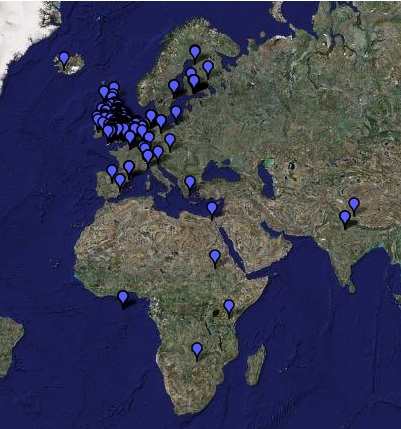Live maps of shipping movements round the UK. Lovely web app.
Category Archives: Web 2.0
The downside of Web 2.0
Hmmm… It’s really tough. On the one hand, one cannot run a business nowadays without taking Google into account. On the other hand, one can’t build a business that depends on Google.
A number of Google services just announced that they are about to shut down. The Google Video team announced that it will shut down uploads in a few months, while the Google Notebook team announced that it is stopping development the service will continue to function, however. According to Danny Sullivan, Google is also closing Jaiku, a Twitter-like micro-blogging service that was bought by Google before it even launched, but which has lingered in invite-only mode ever since. Google Catalog search, which made shopping catalogs searchable, will also be closed soon.
Update: Google will release the Jaiku code under the open source Apache license, so that other organizations can pick up where the Google team left off. It is not clear if current users will be able to transfer their accounts.
Who’s using your name?
Well, more accurately, on which services is your username already taken? Useful service –> Where is Your Username registered.
Album Covers Map
Here’s a really neat mashup.

Word Magazine readers have been busy building a map showing where iconic album cover photographs were taken.
Robbery 2.0
Lovely story in Good Morning Silicon Valley…
As a rule, most criminals are not particularly bright, a fact that gives law enforcement a fighting chance against lousy odds. But once in a while you see a little flash of cleverness that has to be abstractly appreciated despite the way that it was employed. Taking inspiration from similar ploys seen in the movies and adding a Web 2.0 twist, an armored-car robber in Monroe, Wash., escaped Tuesday with the unwitting help of a dozen or so decoys responding to a Craigslist job ad.
According to reports, the suspect — wearing a yellow vest, safety goggles, a blue shirt, and a respirator mask — approached the truck in a Bank of America parking lot, gave the guard a face full of pepper spray, grabbed the cash bag, sprinted about 100 yards to a creek, hopped into a waiting inner tube and floated off to freedom. The getaway vehicle was later found about 200 yards downstream, sans passenger. At the bank, meanwhile, there was no shortage of people matching the robber’s description. A dozen or so men dressed in identical gear were wandering around wondering if their potential employer had stood them up. Each had responded to a Craigslist ad purportedly seeking to hire road maintenance workers for $28.50 an hour, and each had gotten e-mail instructions to show up at 11 a.m. Tuesday near the bank wearing certain work clothing — “yellow vest, safety goggles, a respirator mask … and, if possible, a blue shirt,” said one. The FBI is on the case, hoping the offender was less clever in covering his digital tracks.
User-generated science
This is the headline on an interesting piece in last week’s Economist about the effect of the web on scientific publishing. Excerpt:
Peer-review possesses other merits, the foremost being the ability to filter out dross. But alacrity is not its strong suit. With luck a paper will be published several months after being submitted; many languish for over a year because of bans on multiple submissions. This hampers scientific progress, especially in nascent fields where new discoveries abound. When a paper does get published, the easiest way to debate it is to submit another paper, with all the tedium that entails.
Now change is afoot. Earlier this month Seed Media Group, a firm based in New York, launched the latest version of Research Blogging, a website which acts as a hub for scientists to discuss peer-reviewed science. Such discussions, the internet-era equivalent of the journal club, have hitherto been strewn across the web, making them hard to find, navigate and follow. The new portal provides users with tools to label blog posts about particular pieces of research, which are then aggregated, indexed and made available online.
Although Web 2.0, with its emphasis on user-generated content, has been derided as a commercial cul-de-sac, it may prove to be a path to speedier scientific advancement. According to Adam Bly, Seed’s founder, internet-aided interdisciplinarity and globalisation, coupled with a generational shift, portend a great revolution. His optimism stems in large part from the fact that the new technologies are no mere newfangled gimmicks, but spring from a desire for timely peer review…
Tag clouds: the silver lining

I love tag cloud generators. Wordle, created by Jonathan Feinberg, is the nicest I’ve come across. This is a cloud from some transcripts I’ve been doing for the just-launched Arcadia Fellowship Project, for which I’m Academic Adviser.
Ten years on
This morning’s Observer column…
In the old days, dates fell into one of two categories: BC and AD. Now the relevant categories are BG. and AG: Before and After Google. The critical date was 1998, when Larry Page and Sergey Brin launched their PageRank system for rating web pages. It was an epochal moment. No British child knows there was once a world without Google. In fact most would be astonished that people were able to get along without it.
Google is 10 years old today and it has celebrated by upsetting the world’s applecart – again…
Bit.ly — even tinier URLs
From Webmonkey…
New York-based Betaworks today launched a useful–and cute–URL shortener, Bit.ly. The user-facing features, such as tracking clicks and cookie-based history of recent shortened URLs, are nice. Where Bit.ly really shines is the data it makes available via its simple API.
Without registering for an API key, developers can shorten URLs, expand previously-shortened URLs, and get data about a Bit.ly URL. The information Bit.ly makes available includes the number of clicks, the referring sources of those clicks, and three sizes of thumbnails of the resulting web page.
Bit.ly is a model platform, a great example of how to launch a service with an API.
Yep.
Show Them A Better Way
Charles Arthur pointed me to a really interesting idea. Here’s how BBC News describes it:
The UK government has launched a competition to find innovative ways of using the masses of data it collects.
It is hoping to find new uses for public information in the areas of criminal justice, health and education.
The Power of Information Taskforce – headed by cabinet office minister Tom Watson – is offering a £20,000 prize fund for the best ideas.
To help with the task, the government is opening up gigabytes of information from a variety of sources.
This includes mapping information from the Ordnance Survey, medical information from the NHS , neighbourhood statistics from the Office for National Statistics and a carbon calculator from the Department for Environment, Food and Rural Affairs (Defra).
None of the data will be personal information, the government is keen to stress. Ho!
Bill Thompson has a post about this.
